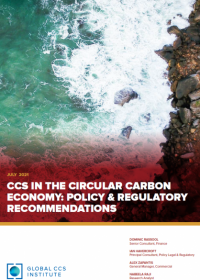リソース
刊行物、報告書および研究調査
検索条件
Developments and Opportunities – A Review of National Responses to CCS Under the London Protocol
4th May 2022
In a perspective released by the Institute, authors Ian Havercroft and Chris Consoli explain how amendments to the London Protocol has enhanced prospects to scale up CCS. With greater flexibility under the London Protocol, including transboundary movement of CO2 aimed for storage now permitted, this perspective looks at how nations in Europe and Asia Pacific are responding to potential CCS opportunities provided with lessened regulatory barriers.
Disclaimer
The content within the Global CCS Institute Publications, Reports and Research Library is provided for information purposes only. We make every effort and take reasonable care to keep the content of this section up-to-date and error-free. However, we make no claim as to its accuracy, currency or reliability.
Content and material featured within this section of our website includes reports and research published by third parties. The content and material may include opinions and recommendations of third parties that do not reflect those held by the Global CCS Institute.
In a report released by the UN International Panel on Climate Change (IPCC) titled ‘Mitigation of Climate Change’, authors – part of Working Group III – pointed to the critical role carbon capture and storage (CCS) will play as a climate solution, on the urgent path to limit global warming.
The Institute takes a closer look at this key IPCC report in a newly released brief, authored by our Senior Policy Adviser on International Climate Change, Noora Al Amer. In it, the Institute unpacks the details of the IPCC findings, highlighting:
- The emissions mitigation potential CCS will provide a wide range of sectors, further supporting pathways to net-zero
- Where CCS stands on the UN’s Sustainable Development Goals
- How scaling CCS deployment can vary based on region
Download the brief below for the full overview.
Disclaimer
The content within the Global CCS Institute Publications, Reports and Research Library is provided for information purposes only. We make every effort and take reasonable care to keep the content of this section up-to-date and error-free. However, we make no claim as to its accuracy, currency or reliability.
Content and material featured within this section of our website includes reports and research published by third parties. The content and material may include opinions and recommendations of third parties that do not reflect those held by the Global CCS Institute.
CCS Networks in the Circular Carbon Economy: Linking Emissions Sources to Geologic Storage Sinks
5th October 2021
Carbon capture and storage (CCS) networks linking emissions point sources to a CO2 transport and storage hub is emerging as the lowest-cost and most cost-effective method of CCS development. As part of the Circular Carbon Economy: Keystone to Global Sustainability series with the Center on Global Energy Policy at Columbia University SIPA, this report reviews emissions and storage basins worldwide, seeking to link clusters of emissions-intensive regions to potential geologic storage basins.
The report is presented in two parts:
- In part one, using a single methodology to characterise global emissions and basins, the authors perform a high-level, regional analysis identifying potential CCS networks by linking suitable storage to intense emissions centres across the globe
- In part two the authors present a conceptual approach to designing a CO2 transport network from distributed sources to a target geological formation for storage, outlining the selection of gas-phase and dense-phase pipeline transport as well as an approach to minimising the cost of pipelines over the network.
Key findings from the report include:
- Potential CCS networks can be identified in almost every industrialised region of the world.
- Those potential networks identified in this report can guide future detailed investigation and planning required for CCS network development.
- Each industrialised region of the world has access to storage resources ranked as highly suitable or suitable.
- The combination of emission sources in proximity to storage sinks means a global portfolio of CCS networks is technically possible. These networks provide the greatest opportunity to rapidly decarbonise large clusters of power and industrial sources.
- Inadequate characterisation of geologic storage resources is the critical limiting factor to CCS network development across the globe.
- Comprehensive national assessments are still needed for the majority of nations. Until these assessments are completed, insufficient understanding of geologic storage resources will remain a significant barrier to CCS network development.
- Pipeline and compression networks require the development of cost models for piping and compression systems for the specific country and local costs of energy and construction. This provides the quantitative basis for decisions in network design.
Disclaimer
The content within the Global CCS Institute Publications, Reports and Research Library is provided for information purposes only. We make every effort and take reasonable care to keep the content of this section up-to-date and error-free. However, we make no claim as to its accuracy, currency or reliability.
Content and material featured within this section of our website includes reports and research published by third parties. The content and material may include opinions and recommendations of third parties that do not reflect those held by the Global CCS Institute.
本文献は、「101 Questions and 101 Answers from the CCS 101 Webinar Series」の参考日本語訳となります。
原典はこちらです→ リンク
Disclaimer
The content within the Global CCS Institute Publications, Reports and Research Library is provided for information purposes only. We make every effort and take reasonable care to keep the content of this section up-to-date and error-free. However, we make no claim as to its accuracy, currency or reliability.
Content and material featured within this section of our website includes reports and research published by third parties. The content and material may include opinions and recommendations of third parties that do not reflect those held by the Global CCS Institute.
2021年4月23日から5月21日までの間、グローバルCCSインスティテュートは、米国議会のスタッフおよび、CCSに関心のあるステイクホルダー向に、「The Carbon Capture and Storage 101 Webinars」と題して、3回のウェビナーを、開催いたしました。 このCCS入門講座へは、世界55カ国から、最大792名、最小465名の参加がありました。
このCCS基礎講座ウェビナーの参加者である、業界関係者、学者、議会スタッフ、報道関係者、そして一般の方々から寄せられた質問総数は101となり、技術的なものだけでなく財政的、地理的、社会的、政治的等多岐に渡っています。
今後CCSの展開がスケールアップしていく際に、恐らく同様の質問が寄せられることが予想され、本書はそれらに対応する教育ツールとしてご参照いただけるものと思います。
本書は英語でかかれておりますが、後日日本語版も公開予定です。
<参考情報>
関連ウェビナー:「The Carbon Capture and Storage 101 Webinars」(2021年4月23日より5月21日まで、三回開催)
第一回録画:“Introducing a CCS Project,”
第二回録画:“CCS Infrastructure for a Net-Zero Future,”
第三回録画:“CCS Policy for a Net-Zero Future.”
Disclaimer
The content within the Global CCS Institute Publications, Reports and Research Library is provided for information purposes only. We make every effort and take reasonable care to keep the content of this section up-to-date and error-free. However, we make no claim as to its accuracy, currency or reliability.
Content and material featured within this section of our website includes reports and research published by third parties. The content and material may include opinions and recommendations of third parties that do not reflect those held by the Global CCS Institute.
Topic(s): ccs, CCS Finance, CCS Investment, Policy
CCS is one of many climate mitigating technologies that is mature, commercially available, and absolutely necessary to achieve global net-zero ambitions and a stable climate. The total installed CCS capacity must increase 100-fold by 2050 to limit global warming to below 2° Celsius.
This report summarises policy and legal factors that have a material impact on the investability of CCS projects and makes recommendations on how governments may facilitate greater private sector investment in CCS.
The report examines and covers:
- Financing CCS
- The development of CCS-specific legal and regulatory frameworks
- Recommendations addressing policy, finance and regulatory matters
Disclaimer
The content within the Global CCS Institute Publications, Reports and Research Library is provided for information purposes only. We make every effort and take reasonable care to keep the content of this section up-to-date and error-free. However, we make no claim as to its accuracy, currency or reliability.
Content and material featured within this section of our website includes reports and research published by third parties. The content and material may include opinions and recommendations of third parties that do not reflect those held by the Global CCS Institute.
One model aligned with the goals of the Paris Agreement, the International Energy Agency's Sustainable Development Scenario (IEA-SDS) requires 15% of the world’s emissions reductions to be achieved using CCS. The need for CCS in the IEA-SDS translates to a 100-fold increase in CCS capacity by 2050, for which this thought leadership report estimates the total capital requirement to be between US$655 bn and US$1,280 bn.
The report discusses the role of governments in creating an enabling investment environment for CCS and makes several recommendations for how to unlock private finance for projects.
The report examines:
- The potential for project finance to greatly accelerate investment in CCS capacity
- The application of green bonds to CCS projects in hard-to-abate sectors such as cement, fertilisers and chemicals
- The potential for climate finance to support CCS deployment in developing countries
Disclaimer
The content within the Global CCS Institute Publications, Reports and Research Library is provided for information purposes only. We make every effort and take reasonable care to keep the content of this section up-to-date and error-free. However, we make no claim as to its accuracy, currency or reliability.
Content and material featured within this section of our website includes reports and research published by third parties. The content and material may include opinions and recommendations of third parties that do not reflect those held by the Global CCS Institute.
2021 is proving to be a busy year for CCS policy in the United States. With the year not yet one third over, Members of the House of Representatives and Senate had already introduced five bipartisan bills that aim to accelerate the deployment of CCS. This brief details the contents of those bills and explains the rationale behind their policy proposals.
More broadly, though, Senior Advocacy & Communications Adviser, Matt Bright, uses this brief to examine the three pillars of CCS policy that undergird the advance of this technology in the U.S. In addition, this brief gives the reader a grand tour of U.S. CCS policy history from its inception to the present day in order to paint a complete picture of how strong policy can accelerate the deployment of CCS. In this way, the U.S. CCS policy landscape can be viewed as a lens to magnify the challenges and opportunities that lie ahead for global CCS deployment in the coming decades.
Disclaimer
The content within the Global CCS Institute Publications, Reports and Research Library is provided for information purposes only. We make every effort and take reasonable care to keep the content of this section up-to-date and error-free. However, we make no claim as to its accuracy, currency or reliability.
Content and material featured within this section of our website includes reports and research published by third parties. The content and material may include opinions and recommendations of third parties that do not reflect those held by the Global CCS Institute.
For CCS to fulfill its potential in reducing significant global emissions, this technology must be deployed in all parts of the world. Yet there are currently very few CCS projects in developing countries.
This report was commissioned by ClearPath and Southern Company to examine the role of climate finance in supporting CCS project development in developing countries.
It investigates:
- The support afforded to existing CCS facilities;
- Reasons for the lack of deployment in developing countries;
- How to overcome CCS investment risks; and
- Relevant global climate finance mechanisms to support the deployment of more facilities.
It was found that while there is a very high need for CCS in several developing countries, their level of readiness for CCS deployment is low. Climate finance has an important role to play in both, improving their level of readiness as well as closing the funding gap in developing CCS projects.
Disclaimer
The content within the Global CCS Institute Publications, Reports and Research Library is provided for information purposes only. We make every effort and take reasonable care to keep the content of this section up-to-date and error-free. However, we make no claim as to its accuracy, currency or reliability.
Content and material featured within this section of our website includes reports and research published by third parties. The content and material may include opinions and recommendations of third parties that do not reflect those held by the Global CCS Institute.
The urgency of reaching net-zero emissions requires a rapid acceleration in the deployment of all emissions reducing technologies. Near-zero emissions hydrogen (clean hydrogen) has the potential to make a significant contribution to emissions reduction in the power generation, transportation, and industrial sectors.
As part of the Circular Carbon Economy: Keystone to Global Sustainability series with the Center on Global Energy Policy at Columbia University SIPA, this report explores the potential contribution of blue hydrogen to climate mitigation.
The report looks at:
- Cost drivers for renewable hydrogen and hydrogen produced with fossil fuels and CCS;
- Resource requirements and cost reduction opportunities for clean hydrogen; and
- Policy recommendations to drive investment in clean hydrogen production.
Blue hydrogen is well placed to kickstart the rapid increase in the utilisation of clean hydrogen for climate mitigation purposes but requires strong and sustained policy to incentivise investment at the rate necessary to meet global climate goals.
Disclaimer
The content within the Global CCS Institute Publications, Reports and Research Library is provided for information purposes only. We make every effort and take reasonable care to keep the content of this section up-to-date and error-free. However, we make no claim as to its accuracy, currency or reliability.
Content and material featured within this section of our website includes reports and research published by third parties. The content and material may include opinions and recommendations of third parties that do not reflect those held by the Global CCS Institute.
「世界のCCSの動向 2020年版」(日本語)を、公開いたします。
こちらは、昨年12月に公開した「Gloal Status of CCS 2020」の邦訳です。
(英語、日本語訳以外にも、中国語、アラビア語訳が閲覧可能)
Disclaimer
The content within the Global CCS Institute Publications, Reports and Research Library is provided for information purposes only. We make every effort and take reasonable care to keep the content of this section up-to-date and error-free. However, we make no claim as to its accuracy, currency or reliability.
Content and material featured within this section of our website includes reports and research published by third parties. The content and material may include opinions and recommendations of third parties that do not reflect those held by the Global CCS Institute.
Carbon Capture and Storage (CCS) are essential technologies to help achieve net zero ambitions. The cost of deployment of CO2 capture, transport and storage systems is of vital economic and environmental importance. This importance will continue to increase as the scale and breadth of CCS deployment grows around the world.
As part of the Circular Carbon Economy: Keystone to Global Sustainability series with Columbia University's SIPA Center on Global Energy Policy, this report examines CCS technology from two perspectives: technology readiness and factors influencing costs.
Key drivers of CCS cost include:
- Economies of scale;
- Partial pressure of CO2 in the source gas;
- Energy costs; and
- Technological innovation.
Mature and emerging technologies in carbon capture, transport and storage are surveyed for technological readiness. Technological development will be a key element of driving future cost reductions in CCS and applying CCS to hard-to-abate sectors such as cement, steel and direct air capture.
Disclaimer
The content within the Global CCS Institute Publications, Reports and Research Library is provided for information purposes only. We make every effort and take reasonable care to keep the content of this section up-to-date and error-free. However, we make no claim as to its accuracy, currency or reliability.
Content and material featured within this section of our website includes reports and research published by third parties. The content and material may include opinions and recommendations of third parties that do not reflect those held by the Global CCS Institute.







